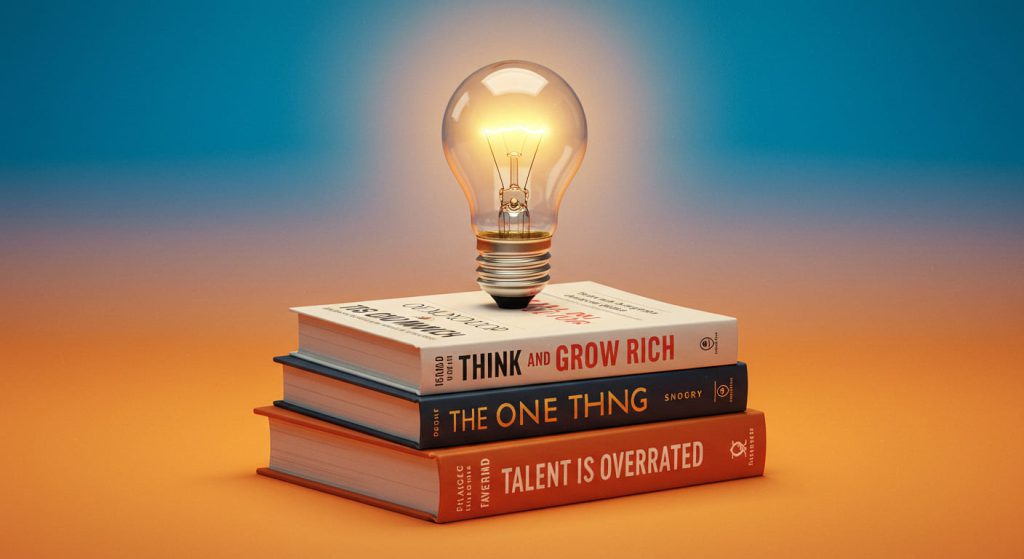Your aspirations might include earning a stellar GPA, securing a lucrative internship, or perhaps, becoming the best version of yourself. Regardless, reading the right books geared specifically towards shifting one’s mindset, sharpening one’s focus and unlocking hidden potential offers a great starting point. We will discuss a few books which when read will change one’s perception about the years to come. These books offer wisdom and practical insights that will help their readers and students in general focus on what really matters and outperform their peers. Would you like to learn how to shift student life to an entirely different student life dynamic? Keep reading and discovering these incredible nuggets of wisdom.
Clarity Is Your Superpower
Imagine staring at your goals squinting and realizing that accomplishing any of them seems impossible. What would you do? How about reading ‘Think and Grow Rich’ — a book normally compared to peeling fog off a dirty, fogged up, windshield. Hill’s one step guide — unapologetically straightforward goal-achieving guide is the best solution one can seek and has clarity regarding achieving anything one seeks, starting as a student.
Start by identifying what it is you want with utter precision and detail. Instead of “I want to do well,” consider “I want an A in Calculus by December.” Next, choose what you are willing to give up, which may include bingeing on weekends or gaming late at night. Create a deadline and outline a plan– such as studying for 2 hours daily. Write down the plan in a concise way and make sure to read it every morning and night. Find a way to incorporate reading the plan into brushing your teeth. This strategy effectively programs your mind for success. How clear and well-defined your goals are at the moment? Employ this technique, and your focus will only sharpen.
Sacrifice for Success
As it turns out, achieving success isn’t solely about actions undertaken– what one has to give up is just as important. This shocking but empowering truth is put forward by Think and Grow Rich. As a student, your body of work, time, and energy are often limited, which makes prioritization critical. Want to nail that internship application? You might be forced to forgo some social times out to refine your resume and relearn some software.
This particular step encompasses balancing trade-offs. For instance, if your aim is achieving higher grades, you may decide to reduce scrolling through social media or watching Netflix. The best part? These sacrifices do not feel like losses when they are associated with a goal you are striving toward. What is one thing you would choose to give up this week to get closer to achieving your goals?
Combining Deadlines with Goals Will Fuel Ultimate Motivation
Goals without deadlines are just wishes. This is something most people learn the hard way and arguably the most famous self-help book on that topic, Think and Grow Rich, tells you right away – set a date for your goal and work toward it. Deadlines are in your reality as a student already with exam dates and project deadlines. The same applies for personal goals as well.
Let’s say you are trying to create a portfolio for summer work. You might state, “I’ll have three projects done by the 30th of April.” This fosters a sense of urgency and allows you to hold yourself accountable. It is said that deadlines tend to constrain procrastination (a phenomenon we are all acquainted with). Now, with all the goals you’ve set for yourself in mind, which one do you think is most realistic considering the deadline you set right now?

Plan Like a Pro
Proposing a solution to a problem that has no underlying plan is akin to preparing for an exam without any prior studying – grab a lucky charm, because that’s the last resort. Think and Grow Rich encourages creating a concrete approach. Students will do this by mapping out the individual parts that accompany their final exams such as scheduling study sessions, enrolling in a study group, or even planning out the essay’s weeks in advance.
Should your aim be to enhance the effectiveness of your public speaking skills, you would need to come up with a structured plan that possibly includes practicing for a minimum of two speeches per week, watching TED Talks, and registering at a recommendation from the campus such as Toastmasters. The essence is paying attention to details; plans that are vague define results that are equally unprecise. What is something you can accomplish within a week that will contribute towards achieving a larger target?
Concentrate on a Single Item
Have you ever attempted trying to multitask and ended up failing at all of them? “The One Thing” by Gary Keller and Jay Papasan is here to help you. It explains that trying to do far too much at the same time, also referred to as goal diluting, ends up dividing your effectiveness and focus. This is a wakeup call presented for prioritizing students.
Set one major goal for yourself this semester. It can be facing a difficult course or setting up a LinkedIn profile that will get you noticed. Give every ounce of energy you can. “What’s the one thing I can do to make everything else easier or unnecessary?” is as simple as a question gets, yet a life-altering one. Perhaps you can transform everything we spoke about in one-hour sessions to daily lectures or partnered work, or start reaching out to one professional per week.
The Power of Singular Focus
The One Thing takes a leaf out of books of people like LeBron James, who went “all-in” on basketball instead of diversifying with a set of safety nets. This train of thought frees up a student’s schedule. You do not have to be proficient in every field all at once. If you enjoy coding, directing all your free time to working on apps is far more beneficial than splitting time doing “just in case” hobbies or focusing on unrelated activities.
This does not imply slacking off on unrelated activities altogether, but rather focus more of your efforts towards your single most important task. Just think–imagine the amount of progress you can achieve when you decide to pin all your focus on a single task.
Work Harder Than Talent
Most people have faced the issue of being jealous of people who seem to have life handed to them on a silver platter. Talent Is Overrated by Geoff Colvin makes you rethink every notion you’ve held on to. It’s bound to get you to reconsider with the argument that talent is nice but if it ever slackens, hard work always wins.
For students, this is empowering—you can do well even when you aren’t the brightest person in the room.
Consider Tom Brady who was drafted 199th but became the GOAT in football because of his relentless drive. The same applies to you. If you are having difficulty in a class, consider extra practice or hiring a tutor. It is what you do, not where you start, that determines your future. This year, in what area can you out work everyone else?
Deliberate Practice Makes Perfect
As discussed in the book Talent Is Overrated, deliberate practice, putting effort into areas just outside your reach, is essential. In learning, this could translate to solving more advanced math problems, polishing a speech to perfection, or coding a self-assignment which is a challenge to the student’s ability.
The objective? It should be demanding not easy. If you are learning Spanish, don’t just memorize words, try to write a story or have a conversation with a fluent speaker. With time, this can create skill. What is one deliberate practice you can commit to today?
Key Takeaways
- Get Clear: Define exactly what you want, like a specific grade or skill, to sharpen your focus.
- Make Sacrifices: Give up distractions, like excessive social media, to prioritize your goals.
- Set Deadlines: Assign a date to your goal to create urgency and accountability.
- Plan Specifically: Craft a detailed plan, like a study schedule, to make progress tangible.
- Focus Narrowly: Pick one key goal and give it your all, like LeBron with basketball.
- Go All-In: Commit fully to your top priority to maximize results.
- Outwork Talent: Hard work trumps natural ability—effort is your edge.
- Practice Deliberately: Push beyond your comfort zone daily to build mastery.
Keep It Flexible, Keep It Yours
These books aren’t a one-size-fits-all formula—your journey as a student is unique. Maybe you’ll tweak the six steps from Think and Grow Rich to fit your schedule or find your “one thing” shifts each semester. That’s okay! The beauty of these ideas is their adaptability. They’re tools to empower you, not rules to box you in. Experiment with them. Start small—maybe set one clear goal this week or try deliberate practice for 15 minutes a day. The key is action. You’ve got the wisdom now—go make this year your best yet. What’s the first step you’ll take?
